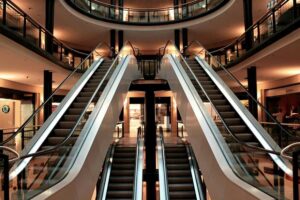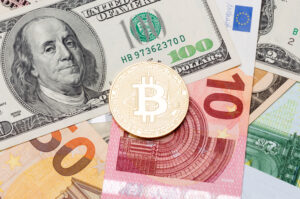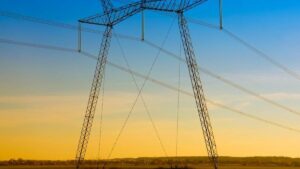
Fixed rental rates for shopping mall stores with an area of 50-200 square meters per year have increased by 1.3% to $22.4 in 2025 from $22.1 in 2024, the UTG press service told Interfax-Ukraine.
“Next year, we can expect a slight increase in rent of 2 to 5%, depending on the region. Further growth in shopping center maintenance costs (OPEX) and mandatory additional costs for uninterrupted power supply will undoubtedly increase the tenant’s overall costs. Currently, there are more significant factors that may influence further increases in rent payments. These include: growing demand among tenants to open stores for network development, a decrease in the supply of high-quality space, and the entry of new operators into Ukraine,” commented UTG Director Yevgeniya Loktionova.
She specified that among the factors stimulating the growth of rates, first of all, is the steady increase in demand for high-quality space from retailers.
According to UTG’s research, as of December 2025, the highest fixed rental rates were for kiosks (1-10 sq. m) – from $70 to $250 per sq. m/month (excluding VAT and EP), for fashion galleries – up to $32, fashion department stores – up to $18, grocery supermarkets, cafes, and restaurants – up to $15. (excluding VAT and EP), fashion galleries – up to $32, fashion department stores – up to $18, grocery supermarkets, cafes, restaurants – up to $15, electronics supermarkets – $8, children’s entertainment centers – $6, movie theaters – up to $6 per sq. m per month.
Overall, the market shows cautiously optimistic trends at the end of 2025. Average daily attendance is growing, although pre-war figures have not yet been restored. For example, the regional format is 680 people per 1,000 sq m GLA in 2025, compared to 660 in 2024 and 760 in 2021. The regional format is 318 in 2025, 308 in 2024, and 407 people per 1,000 sq m GLA in 2021.
As of December 2025, 12.8% of space in the capital’s shopping centers was vacant, compared to 13.1% in 2024 and a de facto vacancy rate of 21.4% at the end of 2022. According to UTG estimates, the temporary closure of the Gulliver shopping center had a minor short-term negative effect, with a de facto vacancy rate of 13%.
In terms of formats, the highest vacancy rate was in regional shopping centers – 14.9%, in district shopping centers – 13.9% of space was vacant, in specialized shopping centers – 10.1%, and in district shopping centers – 6.5%.
UTG was founded in 2001. It has developed over 1,300 real estate concepts. Over the years, the company has leased 4.7 million square meters of commercial space in Ukraine.

Precious metals showed the strongest performance among key asset classes in 2025 amid geopolitical tensions, expectations of a softening US Federal Reserve policy, and seasonally low liquidity at the end of the year.
According to market reports, silver rose 128.47%, gold rose 66.59%, and copper rose 35.45%.
US stock indices also ended the year in positive territory: the Nasdaq added 19.70% and the Russell 2000 added 12.53%.
At the same time, the crypto market showed weaker dynamics: Bitcoin fell by 5.75%, Ethereum by 11.58%, and the altcoin sector by 42.27%.
In the commodities market, the key driver was the “defensive” component of demand: gold hit new all-time highs in 2025, while silver showed relatively sharp growth; copper also strengthened amid bets on infrastructure and industrial demand.

The average price on the primary market at the end of 2025 was $2,011 per square meter, or 84,600 UAH per square meter, an increase of 3.3% in dollar terms over the year, according to a press release from City One Development to Interfax-Ukraine.
According to the company’s analytical report, 2025 was a year of quiet recovery without any sharp movements for the primary residential real estate market in Kyiv.
“In fact, the market went through two different phases. At the beginning of the year, demand remained subdued: buyers took a wait-and-see position, which led to a slight (-1.2%) price adjustment. However, the second half of the year showed a change in sentiment – the number of transactions increased, and prices returned to a smooth increase (on average, they rose by 4.5%). As a result, 2025 ended with a moderate (+3.3%) increase,” said City One Development analyst Olena Shirina.
She emphasized that a distinctive feature of 2025 is the significant difference between formal statistics and the real state of the market, since average price indicators remain “burdened” by projects that have been on sale for years but are not actually being built or are in a frozen state. If such objects are excluded from the calculations, the real average price of active new buildings in Kyiv is about $2,140/sq. m, which is approximately 6-7% higher than the official statistics.
As for the structure of supply, only 3% of the supply is economy class. The dominant segment is now comfort, accounting for about 50% of the supply, business class accounts for about 35%, and premium holds a share of 8-10% despite the reduction in the number of projects.
The most significant price dynamics in 2025 were demonstrated by affordable formats, which is logical in conditions of limited effective demand. Economy class rose by 5% to $1,103/sq. m., comfort class by 4% to $1,365/sq. m., business class by 2% to $2,450/sq. m., and premium class by 4% to $4,596/sq. m.
The new supply for 2025 was a record for the capital, given the military conditions. According to City One Development’s monitoring, 10 new residential complexes have entered the Kyiv market since the beginning of the year.
The first half of the year was dominated by large comfort complexes aimed at the mass buyer. The average starting price was $1,428/sq. m.
The second half of the year brought business and premium class projects to the market with higher starting prices and more complex concepts. The average starting price was $2,727/sq. m.
This indicates a gradual return of developers to more complex formats and a resumption of investment interest in the market.
“The total number of residential complexes on the market has decreased by approximately 25% over the four years of the war, creating a shortage of quality supply. Developers are launching new projects cautiously, focusing on solvent demand and investors, with new projects being more expensive than the market average. The number of new residential complexes is significant for the fourth year of the war, but insufficient for a city with a population of over a million — supply will remain limited, and there will be less affordable housing, with competition between developers increasingly based on product rather than price,” says Shyryna.
According to her, if current macroeconomic and security factors remain unchanged, 2026 has all the prerequisites to start with moderate price increases and a subsequent shortage of quality supply. “The market has already passed its lowest point and is gradually entering a growth phase, where the reliability of the developer, a well-thought-out concept, and the long-term value of the project will play a key role,” says Shyrina.
City One Development is an investment and development company with more than 15 years of experience. It specializes in the creation, implementation, and management of large-scale infrastructure residential complexes, as well as actively investing in the development of Ukrainian industry.
City One Development’s portfolio includes more than 1.24 million square meters of completed projects and 500,000 square meters under construction.
The company’s residential projects in the capital include Novopecherski Lypky, Boulevard of Fountains, Svyatobor Park Resort, and The Light. Its industrial projects include two float glass production plants as part of the City of Glass and Galicia industrial parks.

Ukraine currently imports electricity from Europe around the clock at a maximum capacity of 1.6 GW during peak hours, which does not cover the maximum allowable import capacity due to grid restrictions.
This was announced by Anatoliy Zamulko, acting head of the State Energy Supervision Inspectorate of Ukraine (Derzhenergonadzor), on Thursday during the “Yedyni Novyny” telethon.
“The peak part of imports, depending on the situation, is 1.5-1.6 thousand MW, which is not yet the limit allowed to us by contracts with Europe. The only problem that remains today is network restrictions to push that electricity to eastern Ukraine,” he said.
As reported, the maximum agreed commercial capacity for imports from the EU from December 2024 is 2.1 GW. On average, in November 2025, the utilization of transmission capacity was 27.4%, but during peak evening consumption hours, it increases significantly.
“If we had the opportunity to restore that network infrastructure more quickly, we would certainly have much better opportunities to provide energy through imports,” said the head of the State Energy Regulatory Commission.
As he explained, with the current drop in temperature and the onset of frost in Ukraine, there has been an increase in energy consumption. To balance the energy system, transmission system operators (TSOs, regional power companies) together with regional military administrations are freeing up additional capacity for consumers by including facilities that were not previously subject to disconnection in consumption restriction schedules.
“We are fighting to mitigate the drop in temperature in various ways, including one of the effective tools that will be used throughout Ukraine, which is to take into account the facilities that are to be included in the schedules and increase the fairness that is being talked about in terms of distribution,” Zamulko said.
He stressed that the Ukrainian energy sector continues to function as a single entity.
“We remain a unified energy system, working in parallel with Europe, carrying out all transfers in accordance with the agreements reached with our partners, using import capacities and, if necessary, using emergency assistance,” said the head of the State Energy Regulatory Commission.

The Serbian Economist reports that Prindon Sadrija, the husband of Kosovo President Vjosa Osmani, called on Trump’s son-in-law Jared Kushner to move the Trump Hotel project to Pristina, which his organization had previously rejected in Belgrade.
Sadrija wrote on social network X that the withdrawal from the Belgrade project confirms the thesis that “significant projects should unite, not divide,” and suggested “moving this idea to Pristina” with the transformation of the capital’s Grand Hotel into Trump Hotel.
The statement came amid reports that Affinity Global Development, linked to Kushner, has withdrawn from plans to build a hotel and residential complex on the site of the former General Staff building in downtown Belgrade, which was damaged during the 1999 NATO bombing and has been the subject of public controversy over memory preservation and cultural heritage status.
The company notified the decision to withdraw from the project after months of protests and amid a legal scandal surrounding the removal of the site’s protected status, for which the Serbian prosecutor’s office sought to prosecute a number of officials.
In Serbian statements, the losses are estimated at “at least 750 million euros” – a figure that Serbian President Aleksandar Vucic and representatives of the ruling party have voiced, linking the investor’s withdrawal to the pressure of protesters.
At the same time, earlier publications on the parameters of the project estimated the investment at about $500 million.
https://t.me/relocationrs/1999